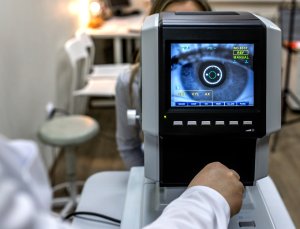Cataract Treatment in Blandon, PA

Voted Best of Berks—
eight years in a row!
Cataract treatment involves surgical removal of the cloudy natural lens of the eye and replacement with an artificial lens to restore clear vision. The skilled team of specialists at Eye Consultants of Pennsylvania in Blandon, PA bring you extensive training and decades of experience.
The cataract specialists at Eye Consultants of Pennsylvania are all board-eligible or board certified by the American Board of Ophthalmology and offer patients the latest advancements in eye care. Several are available to provide complete cataract diagnosis and treatment in our Blandon office.
- Meet Adam J. Altman, MD
- Meet Y. Katherine Hu, MD
- Meet Lawrence E. Kenney, MD
- Meet Christina Lippe, MD
- Meet Michael A. Malstrom, MD
- Meet Mehul H. Negarsheth, MD
- Meet Abhishek K. Nemani, MD
- Meet Jonathan D. Primack, MD
- Meet Kevin J. Shah, MD
Common Questions about Cataracts
Q: What is a cataract?
- A cataract is a clouding of the lens inside the eye. As we age, proteins in the lens start to break down, and the lens may become cloudy. This is called an age-related cataract. It may be mild, moderate, or severe. As time goes on, the cataract may cloud more of the lens. It may also become denser or more opaque, making it difficult to see clearly. Cataracts are not caused by overusing your eyes, and they do not spread from one eye to the other.
Q: Will a cataract go away on its own?
- There is no medication, laser treatment or exercise routine that can make a cataract go away. The only way to “cure” a cataract is with surgery. If you are having problems with your vision, your doctor may recommend removing the cataract and replacing the cloudy lens with a clear lens implant. Cataract surgery is painless and precise. In fact, it is one of the most successful and safest procedures performed in the world.
Q: How long does cataract surgery take?
A: The surgery itself usually lasts less than 10 minutes. However, there will be some pre-surgery preparations and a short recovery period afterward, so you can expect to be in the surgery center for 1 ½ or 2 hours.
Q: Are both eyes treated at the same time?
No, if you have developed cataracts in both eyes, only one will be operated on at a time. The second eye is usually treated within a couple weeks after the first procedure. By performing separate procedures, you can maintain your normal vision in one eye while your other eye heals and improves.
Q: Does cataract surgery hurt?
A: Thanks to anesthetic eye drops and medications that help you relax, most patients experience minimal discomfort. It is normal to have some sensitivity or itchiness for the first day or two after surgery, but severe pain is rare.
Q: Will I be able to see right after surgery? When can I resume my normal activities?
A: Each eye is unique, but most people see well enough to drive the day after surgery. You should also be able to resume reading and watching TV by the next day and return to work within two days to one week. Ask your doctor if you have questions about exercise and other activities.
If you live or work in Blandon, PA and think you may have a cataract, get in touch with the skilled cataract surgeons at Eye Consultants of Pennsylvania to schedule an evaluation and discuss your treatment options.
Find a Doctor
Physician information including education, training, practice location and more.
Schedule an Appointment
Call 800-762-7132 or make an appointment online.





